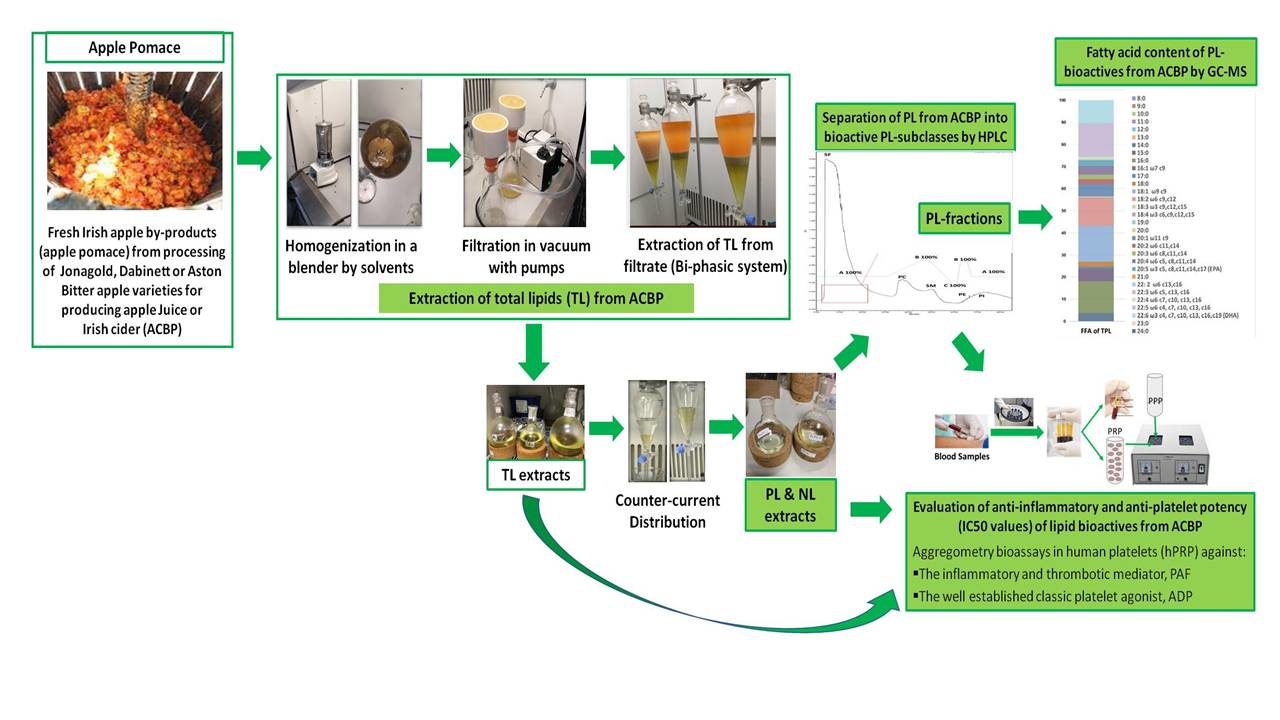Apples, cider and inflammation
Alcoholic beverages like apple cider are considered functional beverages with several health benefits, when consumed in moderation, which are mainly attributed to their microbiota and the plethora of their bioactive compounds. Among them, bio-functional polar lipids (PL) have recently been found in apple cider, which despite low quantities, have exhibited strong anti-inflammatory and anti-platelet properties, while fermentation seems to affect the functionality of apple cider’s PL bioactives. The aim of the present study was to elaborate yeast strains isolated from the complex mixtures of apple surface and must yeasts for evaluating their effects on the anti-platelet functional properties of PL bioactives from their final fermented apple cider products. First, bio-functional PL were extracted and separated from the biomass of the different isolated apple surface/must yeast strains, and were further assessed for their anti-platelet potency against human platelet aggregation induced by the potent inflammatory and thrombotic mediator platelet-activating factor (PAF), or by a classic platelet agonist like adenosine diphopshate (ADP). Novel functional apple ciders were then produced from the fermentation of apple juice by elaborating the most bioactive and resilient yeast strains isolated from the apple must with optimum fermentation properties. PL bioactives extracted from these novel apple cider products were also further assessed for their anti-platelet properties against both the PAF and ADP pathways of human platelet aggregation. These novel cider products were found to contain PL bioactives with lower IC50 values (~40 μg) and thus increased anti-platelet potency against platelet aggregation induced by PAF and ADP. GC-MS analysis of the PL bioactives extracted from these novel apple ciders showed that apple cider PL bioactives are rich in monounsaturated fatty acids (MUFA) and polyunsaturated fatty acids (PUFA), such as the omega-6 linoleic acid (LA) and the omega-3 alpha linolenic acid (ALA), with favorably lower levels for their omega-6/omega-3 PUFA ratio, which further support the observed strong anti-platelet properties putative anti-inflammatory potency for the apple cider PL bioactives. However, further studies are needed in order to elucidate and fully characterize the apple yeast strains that can be utilized for increasing the anti-inflammatory, anti-platelet and cardioprotective functional properties of their fermented apple cider products.
The valorization of apple and cider by-products
The valorization of food industry by-products as sources of bioactive compounds is at the forefront of research in functional foods and nutraceuticals. This study focuses on bioactives of apple cider by-products (ACBPs) with putative cardio-protective properties. Total lipids (TLs) were extracted from ACBPs of apple varieties that are low (ACBP1), medium (ACBP2), and high (ACBP3) in tannins and were further separated into polar lipids (PLs) and neutral lipids (NLs). The functionality of these lipid extracts and of their HPLC-derived lipid fractions/PL subclasses were assessed in vitro against human platelet aggregation induced by the thrombotic and inflammatory platelet agonists platelet-activating factor (PAF) and adenosine diphosphate (ADP). The fatty acid profile of PLs and their most bioactive lipid fractions were evaluated by GC–MS analysis. The PL extracts exhibited higher specificity against the PAF-induced platelet aggregation compared to their anti-ADP effects, while TL and NL showed lower bioactivities in all ACBPs. HPLC analysis unveiled that the most bioactive PL from all ACBPs were those in PL fraction 3 containing phosphatidylcholines (PCs). PLs from all ACBPs and their PC bioactives were rich in polyunsaturated fatty acids (PUFAs) and especially in the essential omega-6 (n-6) linoleic acid (LA) and omega-3 (n-3) alpha linolenic acid (ALA), with favorably low values of the n-6/n-3 PUFA ratio, thus providing a rationale for their higher anti-inflammatory bioactivities. Within this study, highly bioactive PL compounds with strong anti-inflammatory and anti-platelet properties were identified in ACBPs, which can be potentially utilized for producing cardio-protective functional foods and/or nutraceuticals.
Future perspectives
Apple industry produces a number of products (e.g. apples, cider etc) with strong anti-inflammatory properties. The evaluation of these activities against inflammation and chronic diseases is the focus of our group. You can find more about our group here.
Relevant publications
Anti-Inflammatory and Anti-Platelet Properties of Lipid Bioactives from Apple Cider By-Products
Anti-Platelet Properties of Apple Must/Skin Yeasts and of Their Fermented Apple Cider Products
